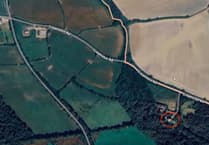Thoughts to ponder
At a recent meeting I attended, the speaker, a rural crime prevention executive for a well-known insurance company, related what he considered to be some simple steps that might help prevent thefts from around our farmhouse, yard and fields.
Tim explained that the most common crime carried out against farmers is theft from farmyards, closely followed by theft from outhouses or sheds, and then from the farmhouse itself.
Regarding the dwelling house he suggests doing an inventory of the security of your doors and windows. He says: “A lock is only as strong as the door you have - so make sure your front and back doors are secure. Consider fitting a door viewer, door chain and limiter.”
Window restrictors allow ventilation but limit opening, so they are secure. “They are also an excellent protection for children. However, always ensure that you do not create any difficulty in getting out of your home in an emergency, such as a fire.”
“Criminals don’t like light,” Tim says. “So, make sure that your property is well lit. Dusk-to-dawn sensor lights can be very effective. Use timer-controlled lights inside the property and lights around the front door of your property are excellent. They will allow you to see a person’s face through the door viewer.
“Also do not leave keys in door locks - even on the inside. Keys can be fished through the letter box in a door. If keys are left in view, that will encourage the criminal so it’s best to create safe storage for keys in your home.”
Property that is marked or identifiable is less appealing to a criminal; it is harder to sell on and a criminal does not want to be found with it. Valuable jewellery, watches, laptops, and so on should be marked, photographed and recorded.
Do not keep large quantities of cash in your home and consider a small safe for storing jewelry and personal documents. Also remember to include these items on your house insurance. In the event of a claim, proof of ownership will be required, so keep records.
“Having a working house alarm is very important,” Tim insists “A monitored alarm is best as they alert designated people if activated and use it at all times. Be aware of the zone functions of your alarm and while home in the evening set the exterior alarm. Even if you are only popping out to the school run or the shop, set the alarm and also teach children how to set the alarm and be aware of the panic alarm button in your home.
“Outside the home, some of the most common items stolen from farms are diesel fuel, home heating oil, power tools, lawnmowers and trailers,” adds Tim. “Garages and outhouses should be secured and doors should be locked with robust locks and the shed alarmed, where possible.
“I would advise people to look at their oil tanks, including home heating oil and farm diesel. Fit a lock on tanks and have them well lit up.
“If you have CCTV, ensure that the camera is trained on the tank. Consider a fuel tank alarm or monitoring system that will alert you immediately if there is any drop in fuel level.
“If your fuel tank is easy to access on a daily basis for you, it will also be easy for a criminal to access. Ensure that your tank is out of the sight and try in as far as possible to have a cage or other structure surrounding it. Consider planting naturally defensive shrubs around your tank. A criminal targeting oil will need access by a vehicle, so have gates locked.
“Power tools, lawnmowers, trailers and other items should be marked and their details recorded. Also a good CCTV system, installed by a reputable person, will add peace of mind and having CCTV cameras trained on strategic locations on your property will deter criminals.”
I shall return to this subject in a future column.
Doggy bag time
A regular reader of this column writes: “I was having a meal with some friends in Belgium recently and noticed how many of them and other customers take home food they leave unfinished. They are not skinflints, but more ideologists in terms of food waste. Where we ate, the restaurant is so used to this request that they have containers at the ready to allow customers to take home the couple of spuds, portion of vegetables or piece of meat they didn’t eat.”
Waste not, want not!
French supermarkets are the first in the world to be banned from throwing out unsold edible food by law, forcing them to donate the goods to charities and food banks. Food for thought for the rest of us, if you excuse the pun.
Twice a year job?
Another reader writes: “Following the Saturday night the clocks had fallen back. In the morning, using the small household ladder, my husband had taken down the kitchen clock to change the time. As he adjusted the hands, I noted the dull face of the clock. I asked Tim to wait while I got a damp cloth to clean it. I wiped the face of the clock, carefully making sure to get into all the curves around the rim. Then, satisfied with my job, I got a dry cloth to shine it. I intend to carry out this task at least twice a year in future!”
Learning time
As one of our resident buzzards soared high in the air, assessing the available prey underneath, it prompted a neighbouring farmer to relate to me how he had once discovered a buzzard with a broken wing. They housed him in a small shed while his children had to collect frogs and mice to keep him fed. After a while he was ready to fly again.
What wonderful training for the next generation.
Living with CF
For the majority of us, we know so little of the problems of living with a child who has cystic fibrosis and maybe we should learn as much as we can about the disease and, possibly, work closely with your doctors to learn how to manage CF.
We are fortunate that specialist teams of doctors, nurses, and respiratory therapists are located at major medical centres around the country providing a vital measure of ongoing medical care that, for sufferers, is so very important.
Most of these centres have pediatric and adult programs or clinics where it is standard practice to have CF check-ups every three months and to closely monitor and significant changes, not least decreased energy or appetite.
Mindful of the hugely successful Children in Need appeal last weekend, it is a great delight to recognise and appreciate the amazing fund raising efforts during the past year of the NFU staff in Wales who, last week, presented the Cystic Fibrosis Trust with a cheque for £11,600.
Bless the day
(For some unknown reason, rugby tales are particularly popular)
Two 90-year-old former Welsh internationals, Mike and Bill, have been friends all of their lives. When it’s clear that Bill is dying, Mike visits him every day.
One day Mike says: “Bill, we both loved rugby all our lives, and we played together for so many years. Please do me one favour, when you get to heaven, somehow you must let me know if there’s rugby there.”
Bill looks up at Mike from his death bed: “Mike, you’ve been my best friend for many years. If it’s at all possible, I’ll do this favour for you.”
Shortly after that, Bill sadly passes on.
At midnight a couple of nights later, Mike is awakened from a sound sleep by a blinding flash of white light and a voice calling out to him, “Mike - Mike.”
“Who is it?” asks Mike sitting up suddenly. “Who is it?”
“Mike it’s me, Bill.”
“You’re not Bill. Bill just died.”
“I’m telling you, it’s me, Bill,” insists the voice.
“Bill! Where are you?”
“In heaven,” replies Bill. “I have some really good news and a little bad news.”
“Tell me the good news first,” says Mike.
“The good news,” Bill says,” is that there’s rugby in heaven. Better yet, all of our old friends who died before us are here, too. Better than that, we’re all young again, it’s always spring time and it never rains or snows. And best of all, we can play rugby all we want, and we never get tired.”
That’s fantastic,” says Mike. “It’s beyond my wildest dreams! So what’s the bad news?
“You’re starting at fullback on Tuesday.”





Comments
This article has no comments yet. Be the first to leave a comment.